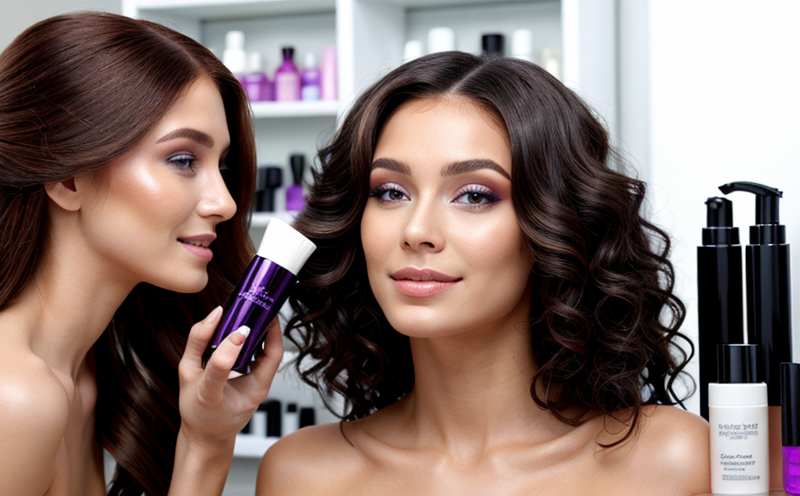Clinical Tolerance Testing of Baby Hair Shampoos
For quality managers and compliance officers responsible for ensuring the safety and efficacy of baby hair care products, clinical tolerance testing is a critical component. This service assesses potential allergic reactions or irritations that may arise from using shampoos intended for infants. The goal is to ensure that the product is safe for use on sensitive skin without causing discomfort or adverse effects.
During this testing process, samples of shampoo are applied to the scalp and hair of participants, typically under controlled conditions in a laboratory setting. Observations are made over specified time intervals to monitor any signs of redness, itching, swelling, or other indicators of irritation or allergic reactions. The duration of observation can vary depending on specific standards but is usually conducted for 24 hours post-application.
Compliance officers will find this service particularly useful as it helps in meeting regulatory requirements set forth by organizations such as the FDA and the European Union's Cosmetic Regulation. These regulations mandate that all cosmetic products, especially those marketed to children, undergo rigorous safety assessments before being made available on retail shelves.
R&D engineers benefit from this service because it provides valuable feedback about ingredient compatibility and product formulation. By identifying problematic ingredients early in development, they can refine their formulations to enhance both performance and safety profiles. Additionally, the results obtained through clinical tolerance testing offer insights into how different populations might respond differently to the same product.
Procurement teams also play an important role by ensuring that suppliers deliver high-quality raw materials which contribute positively towards achieving favorable outcomes during these tests. They need to ensure that only approved ingredients are used in formulations while maintaining cost-effectiveness throughout production processes.
Scope and Methodology
The scope of clinical tolerance testing includes evaluating the skin irritation potential, allergic contact dermatitis (ACD) hazard, and overall safety profile of baby hair shampoos. Here is a detailed look at what this entails:
| Test Parameters | Description |
|---|---|
| Skin Irritation Potential | This aspect checks whether the shampoo causes any visible signs of irritation such as redness, swelling, or itching when applied to the scalp and hair. |
| Allergic Contact Dermatitis Hazard | It assesses the likelihood that individuals may develop an allergic reaction after using the product. This could manifest in symptoms like hives, blisters, or severe eczema. |
| Overall Safety Profile | A comprehensive evaluation ensuring that no adverse effects occur during usage and any potential risks are minimized. |
The methodology involves selecting appropriate participants who represent the target demographic—infants—and applying the shampoo according to prescribed protocols. Observations continue for a set period, allowing scientists to document any reactions accurately.
Key instruments used in this process include scalp and hair simulators that mimic natural conditions closely. These devices help maintain consistent environmental factors like temperature and humidity throughout testing procedures. Other essential equipment includes spectrophotometers for measuring changes in skin coloration indicative of irritation levels.
Industry Applications
Ensuring compliance with international standards such as ISO 10993-18, which specifies biological evaluation requirements for medical devices and other products intended to come into contact with skin.
Meeting regulatory obligations imposed by jurisdictions like the EU, USA, Canada, Australia, and New Zealand.
Supporting product development efforts aimed at creating gentle yet effective formulations suitable for babies' delicate scalps and hair.
Facilitating market entry strategies by demonstrating that products meet stringent safety benchmarks necessary for successful launches in various markets worldwide.
Enhancing brand reputation through transparent communication regarding product safety measures implemented during manufacturing stages.
Baby care brands rely heavily on clinical tolerance testing to establish trust with consumers. Parents often look for reassurances that the products they choose do not pose risks to their children’s health and wellbeing. By investing in robust testing protocols, companies can build strong customer loyalty and foster positive brand associations.
International Acceptance and Recognition
The findings from clinical tolerance tests of baby hair shampoos are widely accepted across numerous countries due to their stringent scientific rigor and adherence to recognized standards. Regulatory bodies around the globe recognize these test results as proof that products meet required safety thresholds.
In Europe, compliance with the Cosmetics Regulation (EC) No 1223/2009 ensures that all cosmetic ingredients used in formulations have been thoroughly evaluated for their safety profiles. Similarly, within the United States, adherence to FDA guidelines guarantees that manufacturers adhere strictly to best practices when developing new products.
Other regions like Australia and New Zealand follow similar approaches based on local legislation. For instance, Australia’s Therapeutic Goods Administration (TGA) requires extensive documentation supporting claims made about product safety during registration processes.
The harmonization of these regulations facilitates easier cross-border trade since companies need not repeat tests conducted elsewhere if they already meet specified criteria. This global acceptance enhances export capabilities for manufacturers while simultaneously protecting public health interests globally.





